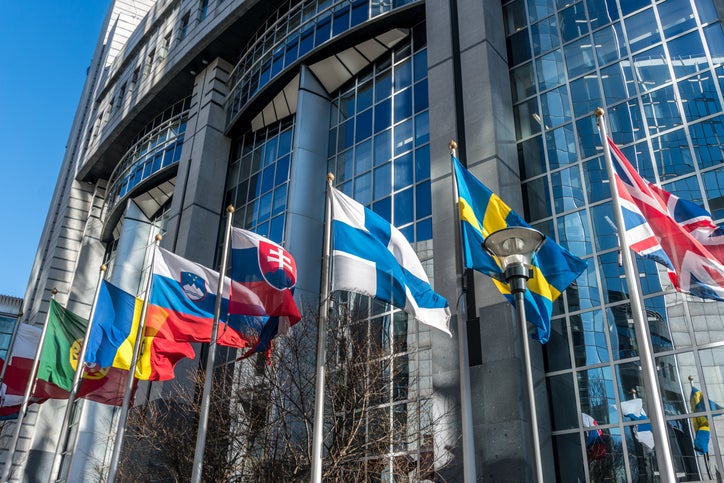 European Parliament is incorporating a set of corporate accountability amendments to safeguard human rights and environmental impact Credit: Getty Images.
European Parliament is incorporating a set of corporate accountability amendments to safeguard human rights and environmental impact Credit: Getty Images.The European Parliament’s negotiating position on due diligence was adopted with 366 votes in favour, 225 against and 38 abstentions.
It means companies in all sectors, including fashion will be required to identify, and where necessary prevent, end or mitigate the negative impact of their activities on human rights and the environment such as on child labour, slavery, labour exploitation, pollution, environmental degradation and biodiversity loss.
They will also be expected to monitor and access the impact of their value-chain partners including not only suppliers but also sale, distribution, transport, storage, waste management and other areas.
Application of new due diligence amendments
The new due diligence amendments are applicable to all EU-based companies with more than 250 employees and a worldwide turnover over EUR40m (US$43.08m) as well as to parent companies with over 500 employees and a worldwide turnover of more than EUR150m.
However, non-EU companies with a turnover higher than EUR150m, if at least EUR40m was generated in the EU, will also be included.
Role of fashion companies and businesses
The new incorporation into CSDDD further states that companies, including fashion brands and retailers will have to implement a transition plan to limit global warming to 1.5° and in the case of large companies with over 1,000 employees, meeting the plan’s targets will have an impact on a director’s variable remuneration such as bonuses.
The new rules also require firms to engage with those affected by their actions, including human rights and environmental activists, introduce a grievance mechanism and regularly monitor the effectiveness of their due diligence policy.
To facilitate investors’ access, information about a company’s due diligence policy should be also available on the European Single Access Point (ESAP).
Sanctions and supervisory mechanism
Non-compliant companies will be liable for damages and can be sanctioned by national supervisory authorities. Sanctions include measures such as “naming and shaming,” taking a company’s goods off the market, or fines of at least 5% of the net worldwide turnover. Non-EU companies that fail to comply with the rules will be banned from public procurement in the EU.
The European Parliament states that according to the text adopted, the new obligations would apply after three or four years depending on the company’s size and smaller companies will be able to delay applying the new rules by one more year.
Rapporteur Lara Wolters said after the plenary vote: “The European Parliament’s support is a turning point in the thinking about the role of corporations in society. A corporate responsibility law must ensure that the future lies with companies that treat people and the environment in a healthy way – not with companies that have made a revenue model out of environmental damage and exploitation. Most companies take their duty towards people and the environment seriously. We help these companies with this ‘fair business law’. And at the same time, we cut off those few large cowboy companies that flout the rules.”
Clean Clothes Campaign sees lack of value chain mapping as missed opportunity
Clean Clothes Campaign (CCC), an alliance of apparel labour unions and non-governmental organisations, said it stood in support of the amendments that will require companies to carry out due diligence throughout their value chain and on all their business relationships, in accordance with UN and OECD international standards.
However, the alliance pointed out, the European Parliament stopped short of embedding value chain mapping and transparency as part of the due diligence obligation.
CCC explained: “A comprehensive risk-identification process should include mapping and disclosure of individual suppliers. Moreover, despite countless reports on the failures of social auditing and verification initiatives in ensuring respect for human rights, the Parliament’s report still gives too much importance to such initiatives.”
The alliance believes grievance mechanisms should have been further made an integral part of remediation. It said the remaining limitations on civil liability are concerning, including the absence of reversal of the burden of proof in favour of those suffering from business-induced violations.
CCC added it was high time for the EU to bring change in the way business is done, given that millions of garment workers across the world see their rights for freedom of association, occupational health and safety and living wages attacked every day.
IndustriALL urges EU negotiators to close remaining loopholes
Meanwhile, IndustriALL, which represents over 50 million workers in 140 countries working in fashion manufacturing, mining and energy sectors said the vote is an important step in putting people and planet before the profits, and making all businesses accountable.
IndustriALL stated: “The time when companies could make profit out of the exploitation of the environment and on the back of their and their suppliers’ workers’ fundamental rights all over the world is soon to be over.
“However the process is not over yet and opposing forces remain active. Lobbying against the EU directive has been extremely high and achieved some wins in the final European Parliament’s vote with: no more reference on a corporate director’s duty to act in the interest of the people and the planet too; no more leeway for Member States to go beyond the EU minimum rules; no reverse of the burden of proof for victims; no full inclusion of the financial sector.”
IndustriALL explained that now the European Parliament has adopted its position, trilogue negotiations can start with the Council and the European Commission for a final adoption of the EU Directive expected by the end of 2023.
IndustriAll Europe, IndustriALL Global Union and affiliated trade unions in more than 100 countries are urging the EU negotiators to close the remaining loopholes and adopt the first-ever transnational binding due diligence rules that the 50 million industries’ workers they represent are demanding.
Source: Just Style






























